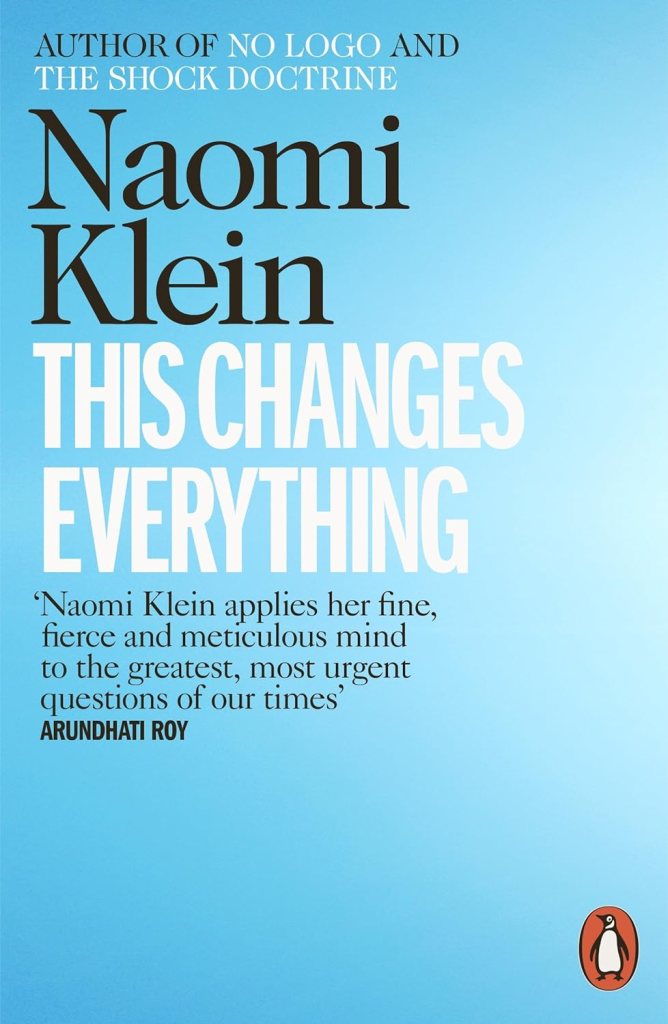They say the personal is political, and in this case, it seems the political is also personal. At first, the idea of a book on doubles could have been reduced to a long essay, but “Doppelganger: A Trip Into the Mirror World” by Naomi Klein slowly unfolds into a whole other quantum parallel world. Klein, known for her incisive expertise on political disorder and environmental catastrophes, turns inwards to look at what the self really is in the midst of misinformation, artificial intelligence and extremism. For Klein, her doppelganger journey with the conspiracy theorist Naomi Wolf, showcases her own shock doctrine, where she raises the question what exactly is individuality, originality and the self?

During my formative years, I had the privilege / misfortune of reading “The Beauty Myth” by Wolf, which, without trying to sound overly self-important, left a profound impact on me. This remarkable work had the power to change the life of a young, insecure teenage girl struggling with serious body image issues.
Simultaneously, Klein’s “The Shock Doctrine” resonated deeply with my political convictions, particularly as a woman hailing from the global south, questioning our dubious capitalist system. However, it’s almost as if Wolf has become a mere shadow of her former self, having had some kind of personality transplant. And so their once-aligned politics now seem to have diverged into separate or “mirror” worlds.
Who is Doppelganger book author Naomi Klein?
MEET THE AUTHOR
Naomi Klein
Naomi Klein, a prominent Canadian author, filmmaker, and social activist, is renowned for her incisive political analyses and unwavering commitment to ecofeminism, organised labour, leftist ideologies, and her critical scrutiny of corporate globalisation, fascism, ecofascism, and capitalism.


With a string of best-selling books to her name, Klein’s literary contributions include “No Logo: Taking Aim at the Brand Bullies” (1999), “The Shock Doctrine: The Rise of Disaster Capitalism” (2007), “This Changes Everything: Capitalism vs. the Climate” (2014), and “On Fire: The (Burning) Case for a Green New Deal” (2020). These works, translated into over 30 languages, have garnered numerous prestigious awards, including the George Orwell Prize, the Sydney Peace Prize, and the Prix Voltaire.
Klein’s influence extends beyond the written word, as she is a frequent contributor to esteemed publications like The Guardian and The Nation. Moreover, she co-founded the climate justice organisation known as The Leap. In 2021, Klein assumed the role of UBC Professor of Climate Justice at the University of British Columbia and became the co-director of the Centre for Climate Justice.
Naomi Klein’s Awards
Her impact on the world is undeniably substantial, as evidenced by her inclusion in Time magazine’s list of the “100 Most Influential People in the World” in 2005, her reception of the Sydney Peace Prize in 2011, her recognition with the Prince of Asturias Award for Communication and Humanities in 2014, and her acknowledgment as one of Forbes magazine’s “100 Most Powerful Women in the World” in 2015.
Identity crisis: double life
This unexpected exploration therefore, began with an identity crisis of sorts. Klein found herself consumed by the enigma of her own dead ringer, “Other Naomi,” whose extreme actions often led to strangers chastising or pitying her. In a bizarre twist of fate, Naomi, renowned for her work on corporate power and global crises, became sidetracked by the relentless pursuit of understanding her uncanny counterpart. The tumultuous events of the world, including the United Nations Climate Summit and geopolitical conflicts, became distant echoes in the face of this eccentric obsession.
Read: The Fraud by Zadie Smith: are we all just imposters? – review
Amid this obsession, a “heat dome” descended on her Canadian home in 2021, resulting in devastating loss of life and natural destruction. Even as the world grappled with climate disasters and the pandemic, Klein’s focus remained fixed on unravelling the mysteries of her alternative twin.
She became a spectator of her own life, neglecting important relationships and responsibilities to follow her lookalike’s erratic journey. Podcasts and online forums became her virtual companions, blurring the line between research and obsession. As she ventured deeper into the web of conspiracy theories and misinformation, she couldn’t help but question the impact of these forces on society.
“The police are bad. But it’s weird: I used to know who the fascists were and who the anti-fascists were. There would be street fights. It was clear which side was which. But now the fascists have totally taken our language. I feel speechless.”
‘Alex’, Quoted in Doppelganger
What is a doppelganger?
“Doppelganger” derives from the German words “Doppel” (double) and “Gänger” (goer), encapsulating the eerie feeling of encountering one’s mirror image. Freud’s concept of the uncanny described this sensation as “the frightening that goes back to what was once well known and had long been familiar.”
For Naomi Klein, her doppelganger experience forced her to question her own identity, creating an unsettling sense of duality. This uncanny journey was not hers alone. People across the world spoke of loved ones lost “down the rabbit hole” of misinformation. The forces destabilising her world seemed to echo those destabilising society on a grand scale.


Klein’s prior work had focused on the ways large-scale shocks disrupted societies, making them susceptible to demagogues. She had believed herself immune to such tactics, but COVID-19 changed everything. The pandemic disrupted her life, leaving her isolated and vulnerable, unable to practice her advice of “gather together, find your footing and your story” to combat collective trauma.
A state of shock, she realised, occurs when we experience an event without a clear explanation. It creates a void that can be filled with simplified narratives and opportunistic agendas. Her mantra, once powerful, became challenging to follow in a world defined by stress and isolation.
Navigating a world of mirrored realities
Klein’s journey led her to explore the concept of doubles in literature and psychology. She saw the duality they represented—the eternal soul and the shadow self. Her identity crisis mirrored a broader cultural struggle with duplicity, where online personas often overshadow real-life selves.
As she followed her apparition deeper into the world of conspiracy theories and far-right alliances, she uncovered a dangerous political formation. She observed society splitting into binary opposites, with people aligning based on opposition rather than shared beliefs.
Yet, this shadow phenomenon was not limited to individuals. It extended to nations and cultures, with liberal democracies confronting their authoritarian twins. As she delved deeper, the commentator couldn’t help but wonder if humanity was approaching a decisive tipping point.
The pandemic, along with other crises, had taken humanity to an unfamiliar place, marked by disorientation, uncertainty, and a struggle to distinguish reality from fiction. It was time to decipher the chaos of doppelganger culture and escape its mind-bending confines, seeking a path towards collective power and purpose.
“No Logo,” no personal branding
Naomi Klein’s encounter with her doppelganger served as undeniable evidence that she had faltered in one of contemporary capitalism’s most cherished pursuits: the development, maintenance, and defence of her personal brand. In the eyes of marketing experts, a personal brand signifies a promise—a commitment to consistency and reliability. Regrettably, her promise had become diluted and tarnished. How else could one explain the confusion between herself and an individual seemingly unable to differentiate between temporary public health measures and a coup d’état?
In the late 1990s, while immersed in her research for “No Logo,” the rumblings of personal branding began to echo, suggesting that this was a path for everyone, not just celebrities, to tread. In her book, Klein delved into this new and contentious concept: that the pervasive job insecurity stemming from vanishing stable employment could be resolved by adopting the branding strategies of figures like Michael Jordan and Oprah. Tom Peters, the management guru, outlined the new paradigm in a 1997 Fast Company cover story titled “The Brand Called You”:
"Regardless of age, position, or industry, we must grasp the significance of personal branding. We are the CEOs of our own entities: Me Inc. In today's business landscape, our primary role is to act as the chief marketers for our personal brand… The encouraging news, and it is, in large part, good news, is that each of us has an opportunity to stand out… Begin by identifying the unique qualities or attributes that set you apart from competitors or colleagues. What have you recently done—this week—to distinguish yourself?"
However, in emphasising that everyone is engaged in the battle for their personal brand, it becomes clear that individuality was never truly present to begin with. Despite her efforts to adopt a more casual appearance, donning black attire and adorning her water bottles with stickers from her book “No Logo,” she had unintentionally engaged in self-promotion. And now we are steeped in influencer culture. Therefore, we need to ask, is this book another form of branding to distance herself from the “Other Naomi?”
Our digital double
According to Klein, Zadie Smith‘s foresight more than a decade ago was truly remarkable. In her commentary on the ascent of Facebook, and by extension, all other social media platforms, Smith astutely noted, “When a human being becomes a set of data on a website like Facebook, he or she is reduced. Everything shrinks. Individual character. Friendships. Language. Sensibility. In a way it’s a transcendent experience: we lose our bodies, our messy feelings, our desires, our fears.”
In this process, we shed our physicality, our intricate emotions, our yearnings, and our fears. However, this isn’t an ascent to a higher state; it’s a descent into a diminished version of ourselves. And this flattened, shrunken self becomes increasingly easy to confuse with a similarly flattened and reduced rendition of another individual.
Read: Authors’ pirated books used to train Generative AI
Doppelganger narratives frequently involve reflections or projections gaining independence, leading to perilous consequences. In Hans Christian Andersen’s 1847 tale “The Shadow,” a man’s shadow comes to life, usurping him. Similarly, in the 1913 silent horror film “The Student of Prague,” a student sells his reflection to rise socially, but it becomes his downfall. This recurring theme in these stories serves as a cautionary tale: beware of becoming infatuated with your own projection, for it might ultimately dominate you.
Austrian psychoanalyst Otto Rank, who had a close collaboration and later a rift with Freud, regarded the soul or even our digital identity, the presumed self beyond death, as the original doppelganger—a defence against feared annihilation. Freud agreed, seeing it as an “insurance” against self-extinction. This notion, like digital doubles, carries a menacing reminder of mortality, making the soul an eerie harbinger of death. Depending on one’s beliefs, an ill-lived life might condemn the spirit double to eternal torment or rebirth as a cockroach. Given the high stakes, Freud and Rank suggest the creation of an evil twin or abject self, onto which sins are projected—a theme in these tales where protagonists mistakenly slay their projected selves, seeking vengeance for the rejection they endured. But what happens if you prefer your digital self over your actual self?
Read: Amazon halts AI-generated books impersonating author Jane Friedman
Mark Zuckerberg’s vision of the “Metaverse,” where we’re represented by personalised avatars, could make this even more perplexing. In March 2022, South Korea elected President Yoon Suk-yeol, who campaigned using a deepfake version known as AI Yoon. Surprisingly, some voters found the fake, openly artificial politician more authentic and appealing than the real one. It’s a sign that digital doppelgangers, like AI Yoon, might be here to stay.
“There is something uniquely humiliating about confronting a bad replica of one’s self—and something utterly harrowing about confronting a good one.”
naomi KLein, Doppelganger
Klein is also weary of artificial intelligence’s ability to mimic us. The extension of personal branding in the online world, makes us surrender our privacy for convenience, tech companies collect vast amounts of data about us. This data shapes our digital doubles, not the idealised avatars we consciously create, but rather machine-generated versions formed from our online actions.
These digital “golems,” constructed from external perceptions and predictions, resemble human clones that the world can mistake for us, influencing our lives. Machines can now replicate us with startling accuracy, causing anxiety for artists who fear AI creating art or music in their style. This rapid replication is seen as a grotesque distortion of humanity by some, like Nick Cave.
“ChatGPT rejects any notions of creative struggle, that our endeavours animate and nurture our lives giving them depth and meaning. It rejects that there is a collective, essential and unconscious human spirit underpinning our existence, connecting us all through our mutual striving.”
Nick Cave
Is it a time of collectiveness?
In “The Origins of Totalitarianism,” Hannah Arendt likens thinking to a dialogue with oneself, emphasising the multiplicity of our inner selves. Dr. Richard Schwartz’s Internal Family Systems therapy further explores our mosaic of contradictory voices. Healthy internal dialogues define humanity, but losing this capacity leads to slogans and, ultimately, totalitarianism – the path she feels Wolf may have ended up on. Embracing our inner voices is crucial in an era of rigid branding, as brands aim for singular identities, while human nature thrives in diversity.
Klein also believes we’re turning towards personal branding instead of collective action in the fight against climate change, bringing her back to her milieu of writing. The pandemic and other crises have propelled humanity into an unfamiliar place characterised by disorientation and a struggle to distinguish reality from fiction. Hence, it is a time to decipher the chaos of doppelganger culture and seek a path toward collective power and purpose.
Read: Bernie Sanders’ new book: a better future without capitalism – review
The bottom line is that Klein distinguishes herself as a leftist with a primary focus on critiquing capitalism’s detrimental impact on our physical well-being, democratic institutions, and the ecological systems essential for our collective survival. In contrast, Wolf falls under the liberal category, driven by the aim of liberating women like herself from prejudice and gender-based inequalities within the existing system, allowing them to achieve personal advancement as individuals. Their diverging viewpoints on capitalism is rather fundamental to their brand.
Thus, in her quest to understand the doppelgangers within and around us, Klein’s exploration serves as a profound reflection on individuality, self, and uniqueness in a rapidly changing world. Her journey navigates the complexities of identity in the digital age, prompting us to question our own sense of self and our place within a mirrored reality.
This books sounds like it has so much to dive into and explore; it’s definitely going on my reading list as I don’t think I’ve read something like this in a while. Thanks for sharing your thoughts!
That’s awesome Molly! My pleasure. Have you read any of her previous books?
[…] Read: Doppelganger by Naomi Klein rethinks self amid mirrored reality – review […]
[…] Changes Everything: Capitalism vs. the Climate” by Naomi Klein. An exploration of the intersection between climate change and the pursuit of a peaceful, […]
[…] Read: Doppelganger by Naomi Klein rethinks self amid mirrored reality – review […]
[…] 📚 Doppelganger: A Trip into the Mirror World by Naomi Klein (2023). A personal and political exploration of our culture’s obsession with doubles and mirrors, and the dangers of the “mirror world” of conspiracy theories and extremism. We’ve been busy this month as we’ve also read Naomi Klein’s mind-bending book about our dark twins. […]
[…] Naomi Klein addresses the case of conspiracy theorist Naomi Wolf’s work being retracted in her latest book “Doppelganger.” She has fallen quite some distance from her seminal third-wave feminist book “The Beauty […]
[…] The commentator and activist confronts the uncomfortable, as she is continually mistaken for the conspiracy theorist Naomi Wolf, whom she dubs ‘The Other Naomi.’ It leads us down a rabbit hole, forcing us to […]
[…] “Doppelganger: A Trip Into the Mirror World“ by Naomi Klein, Allen Lane Hamish Hamilton. Check out our review of Doppelganger. […]
[…] Doppelganger: A Trip Into the Mirror World by Naomi Klein, published by Allen Lane. Check out our review of Doppelganger. […]
[…] by her students. She spoke about the diversity and strength of her fellow nominees, including Naomi Klein and Tiya […]
[…] the non-fiction field, Canadian author Naomi Klein was awarded the inaugural Women’s Prize for Non-Fiction for her book “Doppelganger: A Trip […]